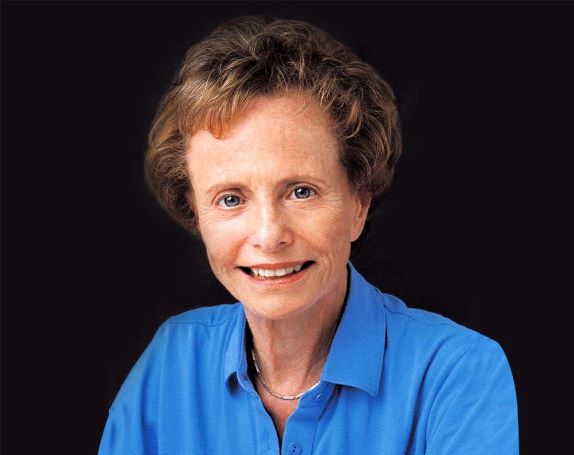By Bob Marrow
Joan Gould Kleinbard is one of those remarkable Rye residents who, for sixty years, has flown quietly under the radar, rarely eliciting the notice she deserved. This seems like a good time to celebrate her as she turns 95 on February 27.
In her 1988 memoir, “Spirals: A Woman’s Journey Through Family Life”, she chronicles her husband’s illness and death from cancer and describes, in prose that often feels like poetry, her evolving roles as daughter, wife, mother, grandmother, and widow. A New York Times reviewer described “Spirals” as, “unlike anything I have ever read before…an honest representation of life’s banalities.”
Her “honest representation of life’s banalities” can depict an angry tirade directed at her high school son over a minor scheduling inconvenience, then morph into guilt-fed expressions of love and mutual need; transform visits with her mother into generational struggles; convert a luncheon between her husband and two law firm associates (which she attended) into a treatise on matrimonial litigation, hourly billing, expense accounts, the relationships between partners and associates, and the fate of associates who don’t “make partner” in spite of exemplary academic careers and superb work at the firm. The Times reviewer was right; the representation of banality has never been expressed with more feeling and insight.
Joan’s prose is poetry. Here is how she describes the experience of walking through the lobby of the apartment building where her mother lived: “My heels clicked on the marble floor of the lobby. The elevator man’s crepe soles squeaked. Except for a single window, never opened, that faced a patch of service court, the light in the lobby was electric, burning night and day in Nesle’s sconces. Through this air that knows no seasons, air that has become gray and old without being changed but without losing its quality either, like tarnished silver, we marched together toward the rear.”
Her poetry in prose can also illuminate her deepest emotions: “It was a year or two after Martin’s death that a change came over me, and when it did, I couldn’t be sure it was my doing — it may have been less voluntary, more biological, than I supposed at the time. Happiness had gone through me like a ray of sunlight, like a spike nailing me in place, passing through the top of my head through my backbone and my heels to the center of the earth, but unhappiness seemed to settle down on me in a lateral direction like a fog, making me spread out toward other people, blurring my edges in a common exhalation of mists and sighs.”
This is her revealing description of the home where she still lives:
“When Martin flung the garage doors open, I heard the hinges creak. Of all the houses on Shad Point [fictional name for Greenhaven], ours may be the only one that doesn’t have an electric garage door; what’s more, it’s the only house in the neighborhood with a one-car garage with old-fashioned wooden double doors. The house stands on so little ground that the narrow garage, with its wrought-iron hinges, is obliged to face the street, instead of being tucked around to the side where it belongs. What’s visible of other houses here on the Point — most of them Tudors built in the Twenties to share a common beach — are half-timbered facades and tapestry brick and casement windows set with an occasional rondel of stained glass, glimpsed behind the rhododendron bushes that are twice as tall as the gardeners.
“We were a couple with two young children (their third child was born in Rye) when we moved from the city and bought this house, but we never moved on to another one that had more land, even when we could afford it. In part this was because Martin had never outgrown the Depression — he always regarded his income, no matter how large, as a temporary state of grace — but in part it stemmed from a different kind of depression. Martin exhibited the gaiety, the extravagance of a truly melancholy man. He was amazed by the present; he’d spend any amount of money on present pleasure, but he mistrusted the future, and not without reason. The squeak of those hinges every time he came home, was a reminder to both of us that he never expected to make old bones.”
A modest house and small plot of land was sufficient.
Martin Kleinbard was a partner and a top litigator in the prominent New York City law firm, Paul, Weiss, Rifkind, Wharton & Garrison. Joan was a published author and journalist. Martin and Joan could have afforded anything they wanted. They didn’t desire extravagance.
“Spirals” was not Joan’s first literary triumph. After studying at Bryn Mawr College, with W. H. Auden, in the 1960s, she wrote articles, including ones about sailboat racing, her passion, for several publications. She wrote numerous books and was a contributor to the New York Times’ “Hers” column, as well as to Esquire, Sports Illustrated, and other notable magazines.
A superb captain of racing sailboats in the Rhodes and Ensign classes, her club was not a private one but the neighborhood Greenhaven Yacht Club. She was selected Commodore more than once. In keeping with her preference for avoiding hyphenated names, she asked that she be called either Madame or Commodore, but not Madame-Commodore.















